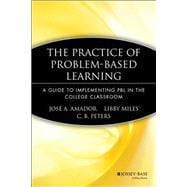
What is included with this book?
Libby Miles is associate professor in the College Writing Program at the University of Rhode Island. She received her B.A. degree in theatre from Williams College (1986), and M.A. (1995) and Ph.D. (1999) degrees in rhetoric and composition from Purdue University. Libby has been at the University of Rhode Island since 1998, where she has taught in the college writing program, the English department's graduate program, and the honors program. She also directed the university's writing center. She has used problem-based learning in several of her writing classes, from Honors Writing for First-Year Students, to Business Communications to a graduate seminar in Rhetoric and Institutional Critique. Her current research interests are the economic and institutional conditions of writing and writing instruction, rhetoric as an agent of social change, and interdisciplinary writing.
C.B. Peter is professor of sociology at the University of Rhode Island. He received his B.A. degree (1971) from Westmont College, and M.A. (1973) and Ph.D. (1977) degrees from the University of Kentucky. His scholarly expertise is in cultural sociology and the sociology of knowledge. In addition to his sociological books and articles, C.B. has published papers and presented workshops and seminars on teaching and instructional design. He has used problem-based learning units with first-year students in large enrollment sections of introductory sociology.
| About the Authors | p. vii |
| Foreword | p. ix |
| Preface | p. xiii |
| Why (We) Use PBL | p. 1 |
| Why We Switched | p. 5 |
| What Is PBL? | p. 10 |
| Issues | p. 15 |
| Changing the Landscape | p. 17 |
| Changing Ourselves | p. 18 |
| Changing Our Courses | p. 24 |
| Changing Our Students | p. 37 |
| No Problems? No Problem | p. 43 |
| The Basics | p. 43 |
| Sources for Problems | p. 46 |
| Designing a Successful Problem | p. 50 |
| Controlling Chaos in PBL: The Messy Middle | p. 73 |
| Conducting Class | p. 74 |
| Our Role | p. 78 |
| Student Contribution | p. 90 |
| What Now? Evaluation, Revision, and Reflection | p. 99 |
| The Students | p. 99 |
| What Worked-and What Didn't | p. 113 |
| The Sustainability of PBL | p. 118 |
| Epilogue | p. 129 |
| Bibliography | p. 133 |
| Index | p. 137 |
| Table of Contents provided by Ingram. All Rights Reserved. |
The New copy of this book will include any supplemental materials advertised. Please check the title of the book to determine if it should include any access cards, study guides, lab manuals, CDs, etc.
The Used, Rental and eBook copies of this book are not guaranteed to include any supplemental materials. Typically, only the book itself is included. This is true even if the title states it includes any access cards, study guides, lab manuals, CDs, etc.